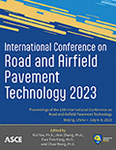Comparison of the Damage Healing Characteristics between Asphalt Binder and Mastic Based on Different Loading Modes
Publication: International Conference on Road and Airfield Pavement Technology 2023
ABSTRACT
The objective of this work is to explore the damage healing characteristics between asphalt binder and mastic using newly developed testing procedures under different loading modes. Both the TS and LAS based-healing procedures are conducted on binder and mastic scales. Experimental and analytical results indicate that the addition of mineral powder into binder does not change the fatigue damage evolution trend in the LAS test; however, the effect of mineral powder addition on the HMC shows obvious asphalt-type dependence. Based on the newly proposed QH index and the QHR-based healing criterion, the healing performance correlation between asphalt binder and mastic are interactively explored. The binder and mastic QH indices display a good linear relationship, regardless of loading modes and binder type. Meanwhile, a certain correlation is also found for the damage healing criteria among these two material scales.
Get full access to this article
View all available purchase options and get full access to this chapter.
REFERENCES
Anderson, D. A., Le Hir, Y. M., Marasteanu, M. O., Planche, J. P., Martin, D., & Gauthier, G. (2001). Evaluation of fatigue criteria for asphalt binders. 80th Annual Meeting of the Transportation-Research-Board, Washington, D.C., USA, January.
Bazin, P., & Saunier, J. B. (1967). Deformability, fatigue and healing properties of asphalt mixes. Journal of Structural Design of Asphalt Pavement, 553-569.
Bhasin, A., Little, D. N., Bommavaram, R., & Vasconcelos, K. (2008). A Framework to Quantify the Effect of Healing in Bituminous Materials using Material Properties. Road Materials and Pavement Design, 9, 219-242.
Bhasin, A., & Motamed, A. (2011). Analytical models to characterize crack growth in asphaltic materials and healing in asphalt binders. International Journal of Pavement Engineering, 12(4), 371-383.
Cheng, D. X., Little, D. N., Lytton, R. L., & Holste, J. C. (2002). Surface energy measurement of asphalt and its application to predicting fatigue and healing in asphalt mixtures. Transportation Research Record, 1810, 44-53.
Castro, M., & Sanchez, J. A. (2006). Fatigue and healing of asphalt mixtures: Discriminate analysis of fatigue curves. Journal of Transportation Engineering, 132(2), 168-174.
Garcia, A. (2012). Self-healing of open cracks in asphalt mastic. Fuel, 93(1), 264-272.
Gong, G. Y. (2022). Study on Healing Characteristic of Asphalt binder and mastic Based on Different Loading Modes. Beijing: Beijing University of Technology.
Johnson, C. M. (2010). Estimating asphalt binder fatigue resistance using an accelerated test method. Madison: University of Wisconsin-Madison.
Kim, B., & Roque, R. (2006). Evaluation of healing property of asphalt mixtures. Transportation Research Record-Series, 1970, 84-+.
Kim, Y. R., Little, D. N., & Lytton, R. L. (2001). Evaluation of microdamage, healing, and heat dissipation of asphalt mixtures, using a dynamic mechanical analyzer. 80th Annual Meeting of the Transportation-Research-Board, Washington, D.C., USA, January.
Kim, Y. H., & Wool, R. P. (1983). A theory of healing at a polymer-polymer interface. Macromolecules, 16(7), 1115-1120.
Lytton, R. L. (2000). Characterizing asphalt pavements for performance. Transportation Research Record, 1723, 5-16.
Seo, Y., & Kim, Y. R. (2008). Using acoustic emission to monitor fatigue damage and healing in asphalt concrete. KSCE Journal of Civil Engineering, 12(4), 237-243.
Shan, L. Y., Tan, Y. Q., Underwood, S., & Kim, Y. R. (2010). Application of thixotropy to analyze fatigue and healing characteristics of asphalt binder. Transportation Research Record, 2179, 85-92.
Shan, L. Y., Tan, Y. Q., & Li, X. L. (2011). Fatigue characteristic of asphalt. Journal of Wuhan University of Technology (Transportation Science & Engineering), 35(01),190-193.
Shan, L. Y., Tan, Y. Q., & Kim, Y. R. (2013). Establishment of a universal healing evaluation index for asphalt binder. Construction and Building Materials, 48, 74-79.
Shen, S. H., Chiu, H. M., & Huang, H. (2010). Characterization of fatigue and healing in asphalt binders. Journal of Materials in Civil Engineering, 22(9), 846-852.
Shen, S. H., & Sutharsan, T. (2011). Quantification of cohesive healing of asphalt binder and its impact factors based on dissipated energy analysis. Road Materials and Pavement Design, 12(3), 525-546.
Sun, D. Q., Sun, G. Q., Zhu, X. Y., Guarin, A., Li, B., Dai, Z. W., & Ling, J. M. (2018). A comprehensive review on self-healing of asphalt materials: Mechanism, model, characterization and enhancement. Advances in Colloid and Interface Science, 256, 65-93.
Tan, Y. Q., Shan, L. Y., Kim, Y. R., & Underwood, B. S. (2012). Healing characteristics of asphalt binder. Construction and Building Materials, 27(1), 570-577.
Wang, C., Castorena, C., Zhang, J. X., & Kim, Y. R. (2016). Unified failure criterion for asphalt binder under cyclic fatigue loading. Road Materials and Pavement Design, 16, 125-148.
Wang, C., Chen, Y. F., & Xie, W. (2020). A comparative study for fatigue characterization of asphalt binder using the linear amplitude sweep test. Materials and Structures, 53(4), 95.
Wool, R. P., & Oconnor, K. M. (1981). A theory of crack healing in polymers. Journal of Applied Physics, 52(10), 5953-5963.
Xiw, W., Castorena, C., Wang, C., & Kim, Y. R. (2017). A framework to characterize the healing potential of asphalt binder using the linear amplitude sweep test. Construction and Building Materials, 154, 771-779.
Information & Authors
Information
Published In
History
Published online: Feb 6, 2024
ASCE Technical Topics:
- Binders (material)
- Correlation
- Damage (material)
- Design (by type)
- Engineering fundamentals
- Engineering materials (by type)
- Fatigue (material)
- Fatigue tests
- Geomechanics
- Geotechnical engineering
- Load factors
- Load tests
- Material mechanics
- Material properties
- Materials characterization
- Materials engineering
- Mathematics
- Minerals
- Soil mechanics
- Soil properties
- Statistics
- Structural design
- Tests (by type)
Authors
Metrics & Citations
Metrics
Citations
Download citation
If you have the appropriate software installed, you can download article citation data to the citation manager of your choice. Simply select your manager software from the list below and click Download.
